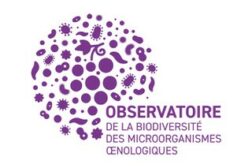Analysing, preserving and conserving biodiversity to anticipate future changes...
Context
The wine industry is facing a number of environmental challenges as part of an agro-ecological transition. Climate change, by altering the microclimate of the grape berry and increasing the sugar content and pH of the must, may have an impact on the diversity of microorganisms involved in the transformation of grapes into wine. In addition, the reduction in the use of sulphur dioxide will eventually modify fermentation communities and potentially encourage the emergence of spoilage microorganisms. For more than 20 years, the microbiologists at the UMR Oenology have developed a range of methodological approaches and relevant indicators for assessing and monitoring changes in the biodiversity of oenological microorganisms, as well as for conserving this biodiversity. These skills will be put to use as part of the observatory to produce scientific data for monitoring biodiversity over several years.
Le projet
‘Analysing, preserving and conserving biodiversity to anticipate future changes’.
 Backed by the UMR Œnologie, the aim of this observatory is to make a long-term commitment to monitoring microbial biodiversity and to help preserve the quality and typicity of wines in a context of transition. Corporate sponsors work with the UMR's researchers to develop the observatory's strategic orientations. They provide the observatory's study areas by supplying samples and associated data (oenological practices, environmental factors, chemical analyses of musts and wines) on which the scientific work will be based. The observatory is responsible for analysing biodiversity at different levels of study (microbial communities, species and strains) and different scales (winegrowing operations, appellations). The microbial biomasses and/or isolated strains will be placed and conserved in the UMR Oenology's collection of microorganisms, which is referenced in European and international catalogues. The scientific questions and areas of work relating to biodiversity monitoring will be developed jointly with the sponsors.
Backed by the UMR Œnologie, the aim of this observatory is to make a long-term commitment to monitoring microbial biodiversity and to help preserve the quality and typicity of wines in a context of transition. Corporate sponsors work with the UMR's researchers to develop the observatory's strategic orientations. They provide the observatory's study areas by supplying samples and associated data (oenological practices, environmental factors, chemical analyses of musts and wines) on which the scientific work will be based. The observatory is responsible for analysing biodiversity at different levels of study (microbial communities, species and strains) and different scales (winegrowing operations, appellations). The microbial biomasses and/or isolated strains will be placed and conserved in the UMR Oenology's collection of microorganisms, which is referenced in European and international catalogues. The scientific questions and areas of work relating to biodiversity monitoring will be developed jointly with the sponsors.
The project is being led by a multi-disciplinary team from the Institut des Sciences de la Vigne et du Vin (ISVV) involvingINRAE, l’university of Bordeaux et Bordeaux Sciences Agro.
It is part of the « ‘ISVV Fund - international ambition for the industry ».
With the support of the Fondation Bordeaux Université, it benefits from the patronage of Château Belair-Monange, Château Coutet, Château Cheval Blanc, Château La Conseillante, Château Palmer, Château Pichon-Longueville, Château Rauzan Segla, Château d’Yquem, Fonds d’initiatives Lafite and Seguin Moreau.

Missions
The Observatory's main tasks are to :
- To carry out multi-annual monitoring of the biodiversity of micro-organisms from grapes to wine and to monitor the emergence of spoilage micro-organisms.
- To formulate scientific questions related to biodiversity monitoring
- Produce scientific data on the biodiversity of oenological microorganisms and communicate it to industry players
- To conserve the biodiversity of oenological micro-organisms
Scientific coordination of the Observatory
Isabelle Masneuf-Pomarede, professor of oenology, works particularly on the microbial ecology of grapes and wine at community level (yeasts, bacteria) and at species level (genetic and phenotypic diversity).
Patrick Lucas, professor of microbiology, is studying the biodiversity of wine bacteria, in particular those of the species Oenococcus oeni.
Marina Bely, lecturer in wine microbiology, is studying the phenotypic diversity of non-Saccharomyces yeasts, their interactions with the S. cerevisiae species and their nutrient requirements.
Jana Rudolf, project manager, expert in wine microbiology.



